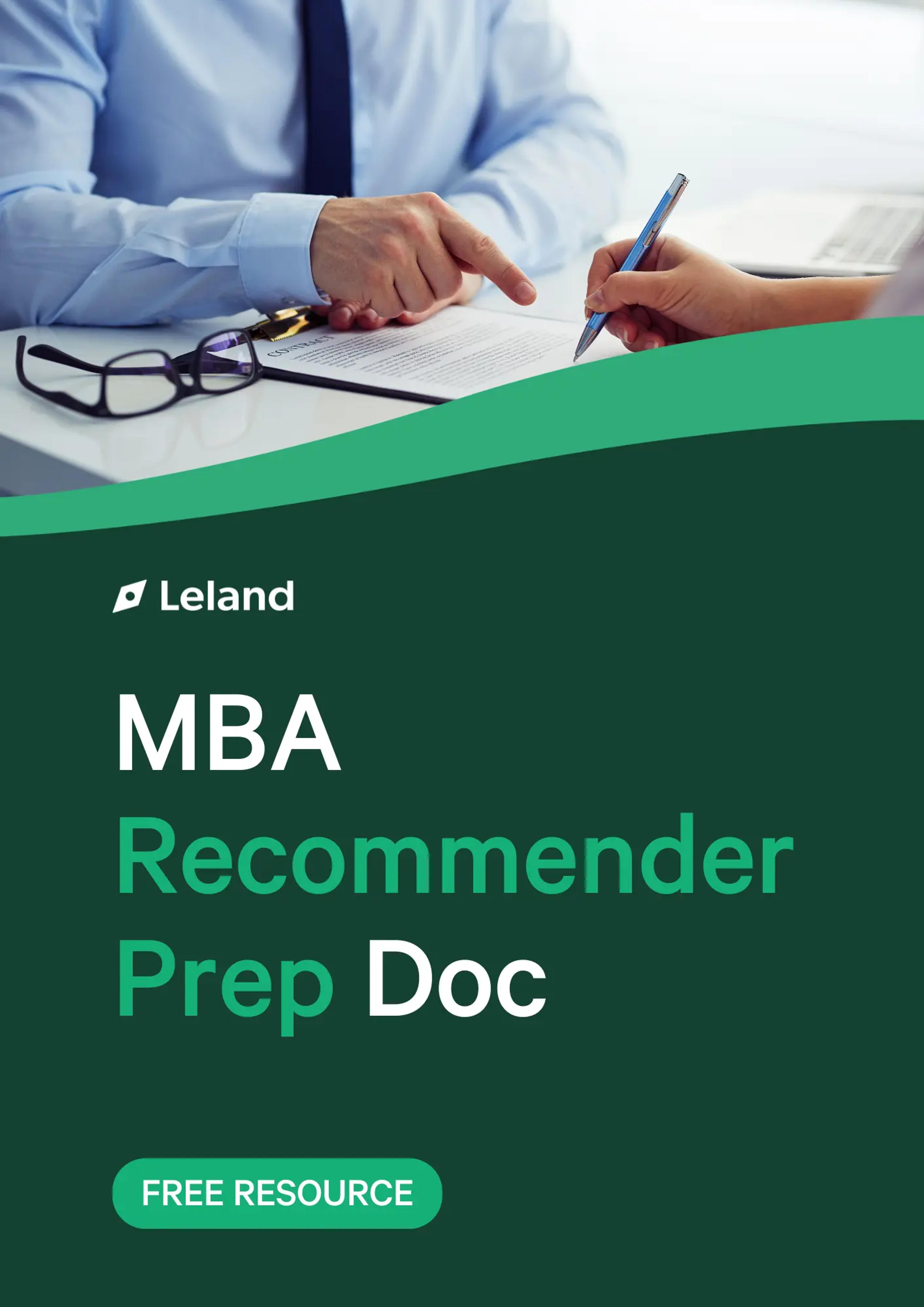HBS Letters of Recommendation: Questions, Analysis, & Tips (2025)
Understand the HBS recommendation questions, what Harvard is really looking for, and how to help your recommenders write letters that truly stand out in this guide.
By Timothy F.
Former Ad Comm | 150+ M7 Admits | Ranked top 4 firm on Poets & Quants 2025
Posted June 13, 2025

Table of Contents
Free Event

Featuring Horatiu S.
Profile Power: A LinkedIn Profile That Gets You In
Starting Tuesday, September 2
11:00 PM UTC · 45 minutes

Featuring Horatiu S.
The Harvard Business School (HBS) letter of recommendation plays a vital role in your MBA application process, often tipping the scale between otherwise similar candidates. Yet many applicants take a passive approach, simply selecting a recommender and hoping for the best.
This guide breaks down the 2025–2026 HBS recommendation questions, explains what the admissions committee is really looking for, and shows you how to support your recommender without overstepping.
I have helped 150+ MBA applicants navigate the applications and get into every M7 program, including HBS. Letters of recommendation are one of the MBA application components that give candidates the most stress but are also the most misunderstood. By understanding what the schools are looking for, and doing what you can to set your recommenders up for success, you can secure killer LORs that give your app the extra leg up.
Read: Harvard Business School MBA: Acceptance Rate, Deadlines, Cost, Requirements, & Program Overview
What Are the HBS Letter of Recommendation Questions? (2025-2026)
As of the 2025-2026 HBS application cycle, Harvard Business School requires each recommender to complete two open-ended questions and a structured evaluation form. These are designed to help the admissions committee assess your leadership, potential, and how you compare to other well-qualified individuals in similar roles.
Here are the official HBS recommendation questions:
- How do the applicant’s performance, potential, background, or personal qualities compare to those of other well-qualified individuals in similar roles? Please provide specific examples.
- Please describe the most important piece of constructive feedback you have given the applicant. Please detail the circumstances and the applicant’s response.
Recommenders also complete a section called "Relationship Context", which includes a brief description of how long and in what capacity they’ve known you (ideally as a direct supervisor), and a drop-down menu rating system covering areas like leadership, interpersonal skills, and analytical skills.
Attributes Rated on the HBS Form
The rating scale covers 15+ traits, grouped into three categories:
- Business-Minded: Analytical thinking, professional maturity, quantitative skills, verbal communication, and written communication.
- Leadership-Focused: Awareness of and respect for others, emotional intelligence, integrity, interpersonal skills with colleagues and subordinates, interpersonal skills with superiors, listening skills, engagement and collaboration, leadership, and development of others.
- Growth-Oriented: Creative problem solving, curiosity, initiative, openness to others’ perspectives, receptiveness to feedback, willingness to change, self-awareness.
After completing the ratings, recommenders are prompted to elaborate on your relative strengths, add specific examples, and reflect on areas for further development.
Why These Questions Matter More Than You Think
The HBS recommendation questions are carefully designed to surface what matters to the admissions committee: not just what you’ve done, but how others have experienced working with you.
Here’s what they’re looking for and why it matters:
- How you solve problems under pressure – They want evidence of your judgment, not just your job title. Have you tackled messy, high-stakes challenges and brought others with you?
- Your growth mindset and coachability – A great letter shows you listened to tough feedback and actually changed. That’s gold to admissions readers.
Expert tip: Many applicants are tempted to select a recommender who will only speak positively about the applicant. Note that a letter of recommendation that is overly positive will be perceived as biased by the admission committee, who will exclude it from their evaluation. - Your leadership in action, not theory – They’re asking: Would I want this person in a section? On my team? In a crisis?
- How you stack up against serious talent – HBS isn’t looking for “good,” they’re looking for “best among peers.” A recommender who’s worked with other rockstars must clearly articulate why you stand out.
- If your personal story fits the HBS model, Your background, motivation, and impact should align with what they call “leaders who make a difference in the world.”
If your letter is vague, generic, or sounds like it could apply to anyone, they’ll assume your impact was, too.
Read: MBA Recommendation Letters: How to Ask, Who to Choose, and What Makes a Great One

MBA Recommender Prep Doc (Template & Example)
Help your recommender write the strongest possible letters with this prep doc, used by thousands of applicants. Download for free.
How to Choose the Right Recommenders for HBS
Pick someone who’s seen you lead in real time, not from afar
When Harvard reads your recommendations, they’re looking for credible, firsthand insight. That means your recommender needs to have been in the room with you, not just on the cc line. Choose someone who’s seen how you lead under pressure, how you communicate with teammates, how you’ve grown as a leader over time, and how you adapt when things don’t go according to plan. The admissions committee can tell the difference between a letter written by someone who witnessed your impact and one written by someone who only heard about it.
Choose someone who can bring your story to life
HBS is looking for storytellers, not scorekeepers. The best recommenders can recall specific moments: the time you stepped up to lead a tough initiative, resolved a team conflict, or earned trust across departments. These stories anchor your application in something real. A recommender who says, “She’s a great leader,” won’t stand out. One who says, “Here’s what she did when the project was falling apart—and here’s how her team followed her anyway,” will.
Expert Tip: The ad comm loves comparative language. Whenever possible, ask your recommender to speak about how your stellar performance compares to other top folks with whom your recommender has associated throughout the years.
Prioritize the people who’ve pushed you
HBS asks your recommender to share the most important piece of constructive feedback they’ve given you. That’s not a softball. It means the admissions team wants to see self-awareness, humility, and growth. If you have someone in your corner who’s challenged you—and seen you improve—they’re in the perfect position to speak to this. A “safe” recommender who’s never given you tough feedback might feel easier to ask, but won’t give HBS what they’re looking for.
Make sure they understand what an MBA recommender really does
Some recommenders write letters like it’s a job reference. That’s not enough. A recommender who understands MBA applications, especially at the level of Harvard Business School, will know to frame your strengths around leadership, collaboration, analytical thinking, and the applicant’s ability to contribute to a classroom full of other exceptional peers. If they’ve never written for an MBA applicant before, consider sharing a short prep doc or even walking them through the HBS questions.
When in doubt, go with your direct supervisor
Unless there’s a compelling reason not to, your current or most recent direct supervisor is usually your strongest choice. They’ve seen you operate at your most accountable—where outcomes mattered, stakes were high, and feedback was frequent. A thoughtful letter from a manager who knows you deeply will always beat a generic one from someone higher up the ladder but less involved in your day-to-day work.
What if your direct supervisor isn’t available?
That’s okay, HBS understands there are situations where asking your current boss could be awkward or risky. In those cases, choose someone senior who has worked closely with you and can vouch for your applicant’s performance, decision-making, and growth. You’ll also have a chance in your application to explain your choice, so be honest and strategic. Just avoid anyone who feels too far removed or personally biased, like family, mentors with limited interaction, or peers.
What to Share with Your Recommenders (Without Overstepping)
You can’t write your own letter (and shouldn’t), but you can make your recommender’s job easier by sharing:
- A one-pager with your MBA aspirations, updated resume, and 2–3 bullets summarizing your most impactful projects or contributions. This helps them recall high-leverage examples they can anchor the letter around.
- A reminder of specific moments where you demonstrated leadership, engagement, collaboration, or resilience. Think: tight deadlines, tough feedback, or team-wide change, you want moments they can narrate, not just mention.
- A quick note on why you chose them, and what you admire about their mentorship or perspective. This builds goodwill and reminds them of your working relationship.
- A short explanation of what HBS is actually asking for, including the two core questions. Most recommenders won’t know these, so make it easy for them to respond directly.
- A heads-up about the online form and submission process, including deadlines. Include any tech quirks, like whether they'll need to set up an account or use a drop-down rating menu.
- Optional: A reminder of any constructive feedback they gave you and how you grew from it. This can jog their memory and help them answer one of HBS’s toughest questions.
Expert Tip: If your recommender has contributed to your performance reviews in the past, giving curating specific anecdotes that align with the broader narrative you’re building and serving them directly to your recommender is a great way to imply, “you’ve shared this about me in the past, I’m simply asking you to share it again.”
Frame these as a single document to support them, not direct them.
Breakdown: How Recommenders Should Approach Each Question
#1: How do the candidate’s performance, potential, or personal qualities compare to those of other well-qualified individuals in similar roles?
This question tests your relative strengths. Great recommenders:
- Share specific examples that illustrate your standout moments—not just traits, but what you did in real situations
- Offer direct comparisons to a diverse range of well-qualified individuals they’ve worked with, ideally with context (“one of the top 5% of product managers I’ve managed in the last 10 years”)
- Reflect on your strengths, growth curve, leadership skills and potential, and overall trajectory—not just current performance
Example Response:
“I’ve managed over 60 consultants at Bain, and Alex stands in the top 5% in terms of client impact and leadership maturity. On a particularly volatile fintech engagement, she restructured our approach to stakeholder communication after spotting a trust breakdown, then personally rebuilt buy-in across three senior execs. Her combination of emotional intelligence and analytical rigor is rare even among our highest performers.”
#2: Describe the most important piece of constructive feedback you have given the applicant. Please detail the circumstances and the applicant’s response.
This is a deep question. HBS wants to know:
- Did the feedback address a real area for development (not a disguised compliment)?
- Was the situation high-stakes, interpersonal, or mission-critical?
- Did the applicant’s response reflect self-awareness, maturity, and meaningful growth?
Recommenders should provide specific examples, ideally with before/after dynamics that highlight your further development.
Example Response:
“Early in our time working together, I gave Jordan feedback on his tendency to dominate team discussions. While his ideas were often strong, his assertiveness sometimes shut down quieter voices. After that conversation, I noticed a deliberate shift—he began pausing to ask others for input, especially junior team members, and even built in reflection rounds after key meetings. It was one of the clearest examples I’ve seen of someone turning feedback into behavior change—and ultimately becoming a more effective, trusted team leader.”
What HBS Is Really Looking for in Each Answer
At HBS, they’re not just looking for “qualified” candidates. HBS wants to admit people who raise the bar on their teams, in how they lead, and in how they grow. They’re not just looking for smart or successful candidates. They’re looking for those who have a real impact and the self-awareness to keep improving.
In the first recommendation question, they want proof that you’re exceptional relative to others. Not just competent but top-tier. Your recommender should share specific examples that show how you lead, influence, or drive results in meaningful ways.
The second question is about growth. HBS cares deeply about how you respond to feedback. A strong answer here doesn’t shy away from real criticism as it shows how you reflected, adapted, and came out stronger.
Together, these questions are meant to confirm what you’ve already claimed in your essays. The best letters don’t just praise you, but they reinforce your story with credible, grounded examples.
Red Flags to Avoid in HBS Recommendations
1. Vague Praise Without Anchored Examples
HBS isn't impressed by adjectives alone, they want proof. A letter that says you're "brilliant, hard-working, and collaborative" without clear, vivid examples is easy for the Admissions Board to tune out. Your recommender should provide specific stories that show you demonstrating leadership, judgment, growth, and impact in real-world situations.
2. Recommenders Who Are Too Junior or Too Distant HBS values substance over title, but your recommender must know you deeply. Letters from someone who barely supervised you, hasn’t seen you lead, or can only speak at a high level signal weak support. Choose someone who has directly observed your leadership, decision-making, and evolution over time, even if they aren't the CEO. Depth of insight always wins over seniority.
3. Overly Polished Letters That Sound Ghostwritten
One of the biggest red flags for HBS is a recommendation that reads like it was drafted by the applicant. Admissions officers can instantly tell when letters feel sanitized, scripted, or suspiciously aligned with your essays. Coach your recommender early by sharing real reminders of your work together, but never draft the letter. The best recommendations feel personal, imperfect, and deeply authentic.
4. No Evidence of Growth or Coachability
HBS is obsessed with trajectory, not just what you’ve achieved, but how you’ve grown. A letter that only highlights your successes, without mentioning how you've responded to feedback or stretched yourself, feels static. Great recommenders highlight how you evolved: moments when you faced challenges, sought input, acted on feedback, and became better because of it. Growth mindset is a major differentiator at Harvard.
5. Lack of Understanding About HBS and Its Values
Recommenders who write generic business accolades ("great team player," "exceeded sales targets") without tailoring their comments to HBS’s leadership and community-building ethos miss the mark. Brief your recommender about what HBS values: leadership, self-awareness, courage, impact, and the ability to inspire others. A few sentences framed through that lens can elevate the letter substantially.
Expert Tip: HBS reads thousands of recommendations a year. The ones that stand out aren’t from the fanciest titles – they’re from people who clearly know who you are at your core, not just what you do. Choose wisely, and invest time helping your recommenders reflect your real leadership arc.
Sample Email + Recommender Prep Sheet
Sample Email to Request a Recommendation
Subject: Request for HBS MBA Recommendation
Hi [Name],
I hope you're doing well. I’m in the process of applying to Harvard Business School, and I’d be incredibly grateful if you would consider writing a recommendation on my behalf.
I’ve always appreciated your mentorship and the feedback you’ve given me over the last [X months/years], and I think your perspective on my growth and leadership would be especially valuable to the admissions committee.
To make things easier, I’ve attached a short prep document that includes:
- A quick summary of why I’m applying
- My resume and recent projects
- What HBS is looking for in recommendations
- Submission deadlines and a link to the form
If you're open to it, I’d be happy to set up a brief call to walk you through anything or answer questions. Either way, thank you so much for considering this—I truly appreciate it.
Best, [Your Name]
What to Include in Your Recommender Prep Sheet
Title: [Your Full Name] – HBS MBA Recommendation Support Sheet
1. MBA Goals (3–4 sentences) - Why you’re applying to business school, why now, and why HBS.
2. Resume - Updated, ideally with 1–2 highlights bolded that reflect key impact or leadership moments.
3. Key Projects or Contributions (3–5 bullets) - Moments your recommender was involved in or witnessed. Include outcomes and specific context.
4. Strengths to Highlight (aligned with HBS values)
- Leadership (transformational, not just positional)
- Growth from feedback
- Team collaboration and communication
- Problem-solving under pressure
- Self-awareness and maturity
5. Summary of What HBS Looks For - A short list of what they’re evaluating in recs: comparative performance, personal qualities, and response to feedback.
6. Official HBS Recommendation Questions - Include both questions in full:
- How do the applicant’s performance, potential, or personal qualities compare to those of other well-qualified individuals in similar roles?
- Describe the most important piece of constructive feedback you have given the applicant. Please detail the circumstances and the applicant’s response.
7. Deadlines and Submission Details - Include: your HBS round deadline, submission platform instructions (email vs. online form), and whether the recommender needs to rate you in any drop-down sections.
The Bottom Line
At Harvard Business School, letters of recommendation are not a formality, they are a core evaluation tool. When written well, they validate everything else in your application: your leadership, your character, your growth, and your potential to thrive in one of the most selective and collaborative classrooms in the world. When written poorly, they cast doubt and HBS will notice.
Your job is not to write your own letter, but to choose the right person, frame the right stories, and prepare them strategically. The best recommendations don’t sound polished: they sound real. They’re vivid, detailed, comparative, and deeply personal. They come from someone who’s seen you in the trenches, given you tough feedback, and watched you evolve. Someone who can say, “Here’s what sets them apart because I’ve worked with the best, and this person is one of them.”
Done well, your recommendation becomes a second voice telling the same story your essays and resume are telling, one of leadership under pressure, self-awareness through feedback, and impact that ripples outward.
If you’re serious about HBS, take your LOR strategy just as seriously. A killer letter doesn’t happen by accident; it’s the result of thoughtful selection, smart preparation, and mutual respect between you and your recommender.
Harvard Business School is one of the most competitive MBA programs in the country and stellar letters of recommendation can make or break your application. It's important to do everything you can to set yourself up for success. For 1:1 support on choosing your recommenders, getting them recommender prep docs, and anything else, reach out to me! I'm here to help you get into your dream MBA program.
Read these next:
- Wharton MBA Letters of Recommendation Guide - Questions, Tips, & Examples
- Chicago Booth MBA Letters of Recommendation Guide - Questions, Tips, & Examples
- Kellogg MBA Letters of Recommendation Guide - Questions, Tips, & Examples
- MIT Sloan MBA Letters of Recommendation Guide - Questions, Tips, & Examples
FAQs
How many letters of recommendation does HBS require?
- Harvard Business School requires two letters of recommendation for each applicant. HBS does not accept additional letters, so choose recommenders who can provide specific, comparative insights that align with what the admissions committee values.
Can I submit my application before my recommenders have submitted their letters?
- Yes, you can submit your application even if your recommenders haven't submitted their letters yet. However, it's crucial to ensure that all recommendation letters are received by the application deadline.
Is the recommendation deadline the same as the application deadline?
- Yes, the recommendation letters are due by the same deadline as the application. It's advisable to communicate these deadlines clearly to your recommenders to ensure timely submission.
What if my recommender hasn't received the notification email?
- If your recommender hasn't received the notification email, advise them to check their spam or junk folders. You can also resend the notification through the application system. If issues persist, contact the admissions office for assistance.
Can I help my recommender with the writing process?
- While you cannot write or draft the recommendation letter yourself, you can provide your recommender with your resume, a summary of your accomplishments, and your statement of purpose to aid them in writing a comprehensive letter.
Written by Timothy
5.0
(98)
I have helped many applicants successfully gain admission to top MBA programs both in the US and in Europe. I worked as an admissions fellow at Chicago Booth. In this role, I interviewed and reviewed the application details of almost 100 applicants across multiple quarters. I understand how to craft a dynamic story that will jump off the page for Ad Comms. Before pursuing an MBA, I started my career at Goldman Sachs, supporting prime brokerage clients with cash and security instruction and settlement. I am currently a project leader at Boston Consulting Group, advising clients mostly in the Gen AI, enterprise transformation, and org design practice areas. At BCG, I have supported clients with pricing strategy, org design, labor optimization, technology integration, and market analysis projects. I am a client service expert and can share valuable insight into how to successfully recruit and be successful at a top-tier investment bank or consulting firm. I earned a B.S. in Economics and in Finance from Utah State University and an MBA with high distinction from The University of Chicago Booth School of Business, where I graduated as an Amy and Richard F. Wallman Scholar.
Timothy has helped clients get into organizations like:
Chicago Booth
Kellogg School of Management (Northwestern)
Columbia Business School
The Wharton School (UPenn)
Yale School of Management











